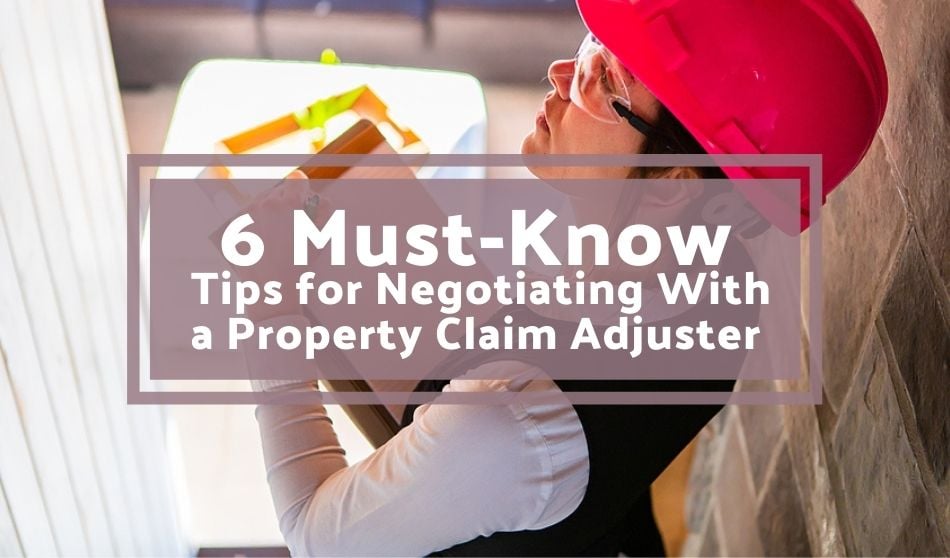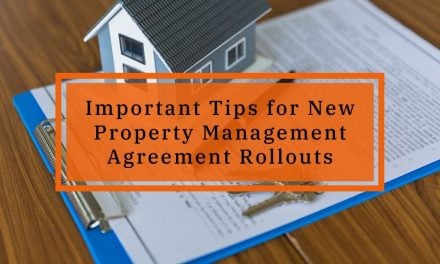Suffering a disaster is tragic, but you can successfully lessen financial loss if you know how to negotiate with a property claim adjuster. It is essential to understand that they work for the insurance company, not you.
Property claim adjusters have the company’s best interest in mind which might not align with yours. They won’t cross the line at displeasing you to the point of having you disenfranchised with the insurance company, but they’ll do their best to keep your settlement as low as they can.
Dealing with an insurance adjuster doesn’t have to be stressful. If you learn the tactics used by insurance adjusters, you stand a good chance of a fair settlement offer. You can also avoid having the insurance adjuster deny the claim. You have to know what you are entitled to so you do not inadvertently leave money on the table.
With the following six must-know tips for negotiating with a property claim adjuster, you stand the best chance of getting through the process with less stress and better success.
1. Review Your Policy
A sure-fire way to avoid falling victim to insurance adjuster tricks is to be well-informed about your insurance policy. It is always best to get your facts straight before entering into any negotiation, so be sure to review your policy carefully. You can also avoid inadvertently committing insurance fraud if you understand your policy.
Remember that your rental property’s insurance coverage may be very different than your own home’s policy. Read your policy more than once. Take note of the wording. Ensure that you had a firm understanding of what you are and aren’t entitled to receive. One of many property insurance claim adjuster secret tactics is withholding coverage information, hoping you haven’t read your policy.
To illustrate, after a tree fell on a person’s property, the property claim adjuster included an amount to have the tree removed. He did not offer information that a new tree’s cost could also have been in the claim. The person would have realized that had they more carefully reviewed the policy. Losing out on a higher settlement was a valuable lesson.
Another thing to check in your policy is whether you can get compensated expenses for loss of use if your property is not habitable after the disaster. You can use these funds to cover mortgage payments, storage costs, and your own living expenses.
2. Know Your Rights
An essential part of knowing how to deal with insurance adjusters is realizing you have the right not to take their first offer. Remember, they work for the insurance company, so it’s advantageous for them to give out as little as possible. However, you should let them make the first offer just in case your research has led you to a lower figure.
One way to scare an insurance adjuster is to let them realize you are poised to negotiate and know your rights. Work up a settlement amount that you believe you should receive if their first offer isn’t reasonable. Don’t hesitate to challenge their first offer if you can substantiate that it should be higher. You can prove your point by showing them parts of your policy and providing quotes from reliable contractors.
Another tip regarding your rights is that you can hire a loss assessor. A loss assessor is different from a loss adjuster because they will be working for you, not the insurance company. They aid in substantiating your claim and getting the best settlement possible. If you choose to go this route, it will be up to you to pay their fee or otherwise compensate them for their services.
You need to know whether you are entitled to replacement cost or depreciated value for any destroyed household assets. Most people opt for replacement value when obtaining property insurance coverage, but don’t assume that is the case in your situation. Your policy will cover which valuation to use and how to substantiate your claim:
- Depreciated Value: If based on depreciated value, you will need to verify each asset’s value by providing the purchase price and date. If you do not have the original receipt, you’ll need to negotiate with the property claim adjuster to come up with a fair amount. Since these assets were likely considered tax-deductible expenses for landlords, your records will hopefully include a documented receipt. If not, you can do a bit of research for historical prices, such as contacting the manufacturer or where you believe you purchased the asset.
- Replacement Value: With replacement value, you should locate current prices for comparable assets. It doesn’t have to be the exact model but should be relatively the same in terms of features.
Take the time to develop a list of damaged or destroyed assets and compile estimates for repairs. You will be in a better position to negotiate for what you should rightfully receive. You may have to go to many sources to get this information together, but it will benefit you in the end.
You also have the right to have someone else speak with the property claim adjuster. If you know someone, such as your attorney, who knows better how to deal with a property insurance adjuster, it can be a good idea to go that route. You might also opt to step back during the negotiations if you cannot seem to agree with the adjuster on a settlement amount.
3. Take Notes or Record Conversations
Any negotiation involves going back and forth on the key points of the claim. It can get confusing for both you and the property claim adjuster if you don’t take careful notes or record conversations. A recorded statement for a property insurance claim can help resolve disputes. From an ethical standpoint, be sure to let the property claim adjuster know if you record a conversation or take notes.
Be sure to compare your final settlement offer with your notes and recorded conversations to ensure the settlement matches the verbal promise.
4. Be Honest and Polite
How to get the most out of an insurance adjuster is through honest and polite exchanges with them. You won’t get them to budge on their first offer if you have insulted them or they lose faith in your honesty. If you exaggerate or embellish on the facts and insurance fraud is proven, they could deny your claim, and you could face criminal charges.
Treat the property claim adjuster with respect instead of in an adversarial manner. You will both have a more pleasant experience. It can also result in a better outcome for you.
5. What Should You Not Say To a Claims Adjuster?
As already noted, do not say anything untrue to the property claim adjuster. It won’t bode well if they uncover your deception. You should never admit any fault or even partial liability for what occurred. Often, the less you say, the better. Don’t offer theories about the damage.
All repair and replacement costs should be substantiated rather than based on your opinion. Even though you should record conversations, you should disagree for them to take a recorded statement. Lastly, do not accept the first settlement offer. Instead, ask them to justify it and provide an itemized listing to determine why it isn’t what you expected. Do not sign anything without reading it carefully.
6. What Makes a Good Claims Adjuster?
There are good claims adjusters and those you will struggle to work with through the claim process. One might employ one or more insurance adjuster delay tactics where another works quickly toward the settlement of your claim. If you are fortunate, you won’t be asking, “when might a loss assessor be appointed?” because you’ll have one right away.
An outstanding claims adjuster possesses the following traits:
- Good communication skills, including emotional self-control
- Manages their time well
- Exhibits technology proficiency
- Familiarity with the insurance policy
- Knowledge of construction and repair processes and costs
It might be more challenging to determine how to talk to an insurance adjuster that doesn’t have these traits, but it is still possible. You may have to compensate for any areas they lack, including listening to them carefully if they don’t communicate well. If you understand these traits, you are better positioned to know how to deal with whatever type of adjuster you end up facing.
Also, keep in mind that if a disaster affects many properties in an area at once, delays could have little to do with the claims adjuster’s abilities or as a planned delay tactic. They could just be overwhelmed by numerous claims at one time.
Final Thoughts
With more knowledge about how to deal with insurance adjusters, landlords are more likely to be made whole again by the final settlement offer. Learning loss adjuster tricks and knowing your rights will allow you to successfully put the disaster’s unpleasantness behind you.
Insurance is designed to provide security against financial setbacks due to disasters. It can only do that if you handle the process carefully. Whether you are dealing with a claim on your rental property, primary home or vacation home, it pays to know how to negotiate with an insurance adjuster for property claims.







How wonderful that you explain what to look for in a great public adjuster, like communication skills. I am working on getting my insurance adjusted after having my first baby. I will find a public adjuster to help as well.
Are you adjusting your homeowners insurance after having a baby? Does that make the insurance go down?
What does a Public adjuster Do?
We had a major water damage to our Manufactured Home. The mitigators who took over after we filed Claim we’re doing everything good. Until My husband just couldn’t take it anymore. We we’re out of our home for 3 months and nothing. Everyone got paid but us The Mitigators, Plumber out of our pockets, The people who came & destroyed our kitchen. We paid $1400 for a license estimator to draw up what it was going to cost us to put home back in livible condition. The Mitigators told us the estimate was for $65,000, The adjuster said Nope. $43,000, he said they had to do an depreciation because home was old and he did $14,000 depreciation. It cost us $43,000 just to buy all materials needed. It cost $9,000 Kitchen, $6,000 All Water pipes out of pocket and to top it off my Husband & I are trying to put back together and he has Stage 4 GIST Cancer. I called adjuster that I needed to pay a contractor to finish fixing our home and he said Sorry, Mitigators agreed & made that deal. Is there anything we can do??? HELP